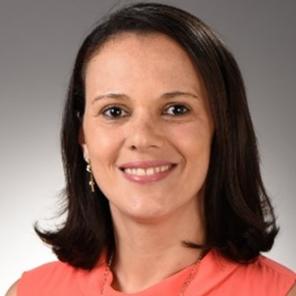
Aline Petrin is a tenure-track Assistant Professor in the Iowa Institute for Oral Health Research and Department of Orthodontics at the University of Iowa College of Dentistry, Iowa City. Aline obtained her M.S. and Ph.D. in Genetics from the Universidade EstadualPaulista Julio Mesquita Filho, Botucatu, São Paulo, Brazil. Dr. Petrin joined the University of Iowa as a postdoctoral fellow in November 2007. After a 5-years hiatus, she rejoined the University of Iowa and was awarded a NIDCR Mentored Career Development Award to Promote Diversity in the Dental, Oral and Craniofacial Workforce (K01). Dr. Petrin’s research focuses on craniofacial birth defects, with a primary focus on the genetics and epigenetics of nonsyndromic cleft lip and palate. Her lab investigates the role of DNA methylation in the etiology of orofacial clefts using a distinct cohort of monozygotic and dizygotic twins discordant for clefting. The main goal of Dr. Petrin’s current project’s is to combine epigenetic and genetic approaches to better understand how the epigenome influences the molecular basis of craniofacial defects.
1. How did you first learn about AADOCR and what motivated you to join?
I learned about AADOCR after I joined the University of Iowa College of Dentistry in 2016. We have a strong research program, and many faculty and students present their works in the Annual Meeting. I think one of the great benefits that AADOCR offers is the opportunity to interact and build collaborations with outstanding scientist from different areas of the dental sciences. Being a member of AADOCR is a wonderful opportunity to connect discovery and clinical science.
2. What do you find to be the most valuable benefit of AADOCR membership?
In addition to what I mentioned above, being a member of AADOCR offers the chance to connect with leadership and potential mentorship for career development. I believe that being a member of this association benefits people in all career levels, from students to the most senior scientists.
3. You have been selected as a mentee for the 2021-22 class of the AADOCR Mentoring an Inclusive Network for a Diverse Workforce of the Future (AADOCR MIND the Future), congratulations! What motived you to apply for this program?
I am honored to be selected as a mentee for the 2021-22 class. As a junior faculty, I believe that the program will provide me the mentorship and training to focus on my short- and long-term career goals by giving me the support to develop into an independent researcher. Plus, this mentoring network will be important to my progression to achieve tenure by the development of a high-quality funded program as an independent scientist.
4. What excites you most about being part of AADOCR MIND the Future?
I am excited to meet the other mentees and mentors. I think the program will help me set priorities, build a stronger network, and expose me to a variety of scientists in different research areas, which will also help increase my visibility in the dental, oral, craniofacial sciences. From what I know about the program, we will have opportunity to improve communication, grant writing skills, research management, and navigate and overcome common challenges faced by early career investigators. Above all, I am excited to interact with the mentors/mentees and improve my own mentoring skills.
5. What do you view as the best way for other members to become more involved in AADOCR and get the most out of the membership?
AADOCR has a lot to offer. I believe all members can find a niche in the association that triggers their interest. A good way to start is by getting involved with the local sections and start building up your network from there. There is always an opportunity to help and to learn. Attending the meetings, presenting your work, and participating in discussions is rewarding experience.




